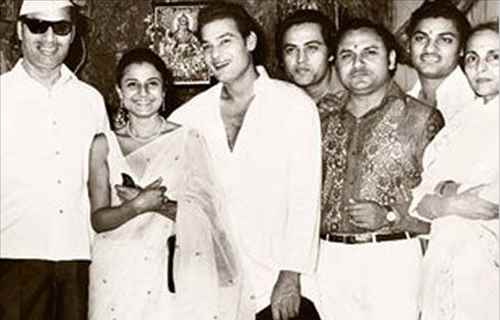
Meet Shomu Mukherjee’s Siblings: Joy, Deb, Rono, Subir and Shibani Maulik Mukherjee
The Mukherjee-Samarth family is a pillar of Indian cinema, with a rich legacy that spans generations and connects some of Bollywood’s most iconic names.
At the center of this influential dynasty is Shomu Mukherjee, a filmmaker whose work as a director, writer, and producer left an enduring imprint on the industry.
Trending Now!!:
Born on June 19, 1943, in Jamshedpur, Bihar (now in Jharkhand), Shomu hailed from a prominent Bengali Brahmin family with deep roots in Kolkata. Raised in Mumbai, he was immersed in cinema from an early age, growing up in a household where film was more than just an art—it was a way of life.
His father, Sashadhar Mukherjee, was a pioneering filmmaker and the founder of Filmalaya Studios, while his mother, Sati Devi, was the sister of the legendary Ganguly brothers—Ashok Kumar, Kishore Kumar, and Anoop Kumar. Shomu followed the Hindu faith and was the fourth of six siblings.
Alongside his brothers Joy, Deb, Rono, and Subir, as well as sister Shibani Maulik Mukherjee, Shomu was part of a family where each member uniquely built the Mukherjee cinematic legacy. While Shomu made his mark behind the scenes, his siblings also contributed significantly to the family’s enduring influence in Indian entertainment.
This article delves into the lives of Shomu Mukherjee‘s siblings, spotlighting their individual journeys and their place within the legendary Mukherjee-Samarth film lineage.
Joy Mukherjee
Joy Mukherjee (February 24, 1939 – March 9, 2012) was the second eldest of Shomu’s siblings and a leading actor of the 1960s, known for his charm and romantic roles.
Born in Jhansi, Joy debuted with Love in Simla (1960), a hit that paired him with Sadhana and established him as a heartthrob. He starred in successful films like Phir Wohi Dil Laya Hoon (1963), Love in Tokyo (1966), and Ziddi (1964), often opposite actresses like Asha Parekh.
Joy’s production company, Joy Mukherjee Productions, gave Bollywood gems such as Humsaya (1968). Later, he directed films like Chhailla Babu (1977), a box-office success starring Rajesh Khanna. Married to Neelam Sodhi, Joy had three children—Simran, Sujoy, and Monjoy. His warm screen presence and entrepreneurial spirit made him a standout figure in the Mukherjee clan.
Deb Mukherjee
Deb Mukherjee, born in Kanpur, brought versatility to the family legacy as an actor and producer. Active in the 1960s and 1970s, Deb appeared in films like Tu Hi Meri Zindagi (1965), Sambandh (1969), and Ek Bar Muskura Do (1972), the last of which was produced by Shomu and featured their future sister-in-law, Tanuja.
Deb’s rugged appeal suited both lead and supporting roles. He later transitioned to production, delivering films like Karate (1983), starring Mithun Chakraborty.
Deb’s son, Ayan Mukerji, is an acclaimed director known for Wake Up Sid (2009) and Brahmāstra (2022), extending the family’s influence into modern Bollywood. Deb’s adaptability and behind-the-scenes contributions complemented the family’s creative output.
Rono Mukherjee
Rono Mukherjee, the eldest sibling, was a filmmaker with a distinctive vision. Less prolific than his brothers, Rono directed and composed music for The Anatomy of a Coward (1966), a project under the Filmalaya banner.
Though his directorial ventures were limited, Rono’s influence persisted through his children, Sharbani Mukherjee and Samrat Mukherjee, both actors. Sharbani debuted with the hit Border (1997) and worked in Hindi and Malayalam cinema, while Samrat appeared in films like Bhai Bhai (1997).
Rono’s reserved yet creative presence added depth to the Mukherjee family’s artistic endeavors, bridging the gap between the family’s early and later generations.
Subir Mukherjee
Subir Mukherjee, one of Shomu’s younger siblings, maintained a lower profile but contributed significantly as a producer. Often referred to as Shubir in some records, he worked within the family’s Filmalaya Studios, supporting projects that carried the Mukherjee name.
Unlike his actor brothers, Subir focused on the business side of filmmaking, ensuring the smooth operation of the family’s ventures. Details about his personal life are scarce, reflecting his preference for staying out of the spotlight.
Subir’s behind-the-scenes role was vital in sustaining the family’s legacy during Bollywood’s transformative years.
Shibani Maulik Mukherjee
Shibani Maulik Mukherjee, Shomu’s younger sister, was the only daughter among the siblings. While she did not pursue a career in cinema, Shibani’s presence was integral to the family’s cohesion.
Married into the Maulik family, she remained connected to the Mukherjees’ cinematic world through her brothers and their endeavors.
Shibani’s life outside the public eye symbolized the balance between the family’s high-profile achievements and their private bonds. Her role as a sister tied the siblings together, grounding them amid their bustling careers.
Shomu Mukherjee
Shomu himself was a dynamic force, producing films like Ek Bar Muskura Do (1972), where he cast Joy, Deb, and Tanuja, whom he later married in 1973.
He directed and wrote films such as Nannha Shikari (1973), Chhailla Babu (1977), Lover Boy (1985), and Pathar Ke Insan (1990), collaborating with stars like Rajesh Khanna and Sridevi. Shomu and Tanuja’s daughters, Kajol Mukerji and Tanishaa Mukerji, continued the family tradition, with Kajol becoming one of Bollywood’s most celebrated actresses.
Shomu’s death on April 10, 2008, from a heart attack marked a poignant loss, but his work endures through his family’s ongoing contributions.
NOTICE!! NOTICE!! NOTICE!!
DISCLAIMER!! : Every Biography and Content Published On TheCityCeleb are For Knowledge Reason. Don't Hesitate to Reach Out for Any Correction || Suggestion || Copyright!!CORRECT@thecityceleb.com


